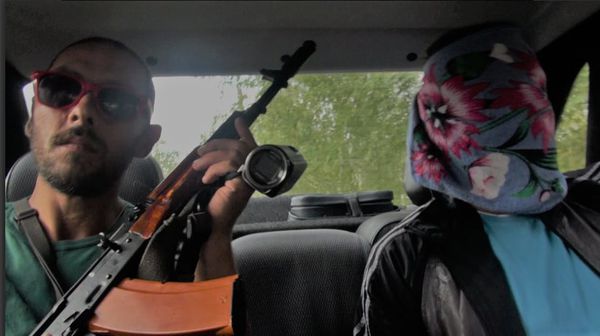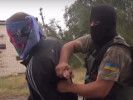Eye For Film >> Movies >> Flight Of A Bullet (2017) Film Review
Flight Of A Bullet
Reviewed by: Amber Wilkinson

Some say war is hell, but as a succession of documentaries charting the scrappy nature of conflict in warzones from Syria to Afghanistan and this one in eastern Ukraine show, in addition to being deadly, it can also be deathly boring for much of the time.
Beata Bubenec's film attempts to offer a snapshot of Ukraine’s Aidar Battalion - a volunteer anti-separatist unit, disbanded in 2015 - shot in a single take during the Russian-Ukraine conflict. This may sound audacious on paper - and it has certainly stirred up controversy, sparking violent protest when it was screened in Moscow. In practice, however, this approach emphasises the film's weaknesses more than its strengths. The first 20 minutes are worth seeing, as an inspection of a bridge is suddenly interrupted by a man objecting to Bubenec's camera. Suddenly, things escalate as an armed soldier arrives and aggressively rounds on the man, accusing him of separatism and bundling him into a car.

Bubenec tags along as he is taken in for an interrogation that shows how quickly judgements are made and allegiances can shift in this sort of febrile atmosphere. It also emphasises the oddly surreal nature of these sort of conflicts that happen as civilians attempt to carry on life 'as normal'.
From then on, its all downhill because Bubenec is so wedded to the single take. This means we are taken on motion-sickness inducing wanders down corridors and forced to watch everything from a jealous soldier's interminable argument with his girlfriend to a discussion about what to put in sandwiches. There is the kernel of an interesting line of interrogation here, about male aggression and the way that conflict can fuel toxic masculinity, but this is not brought sufficiently into focus.
Judicious editing of considerably more footage - and interviews indicate she shot around 400 hours - would have given her the opportunity to develop the film into something more cohesive regarding the state of the nation. As it is, we learn little about the men or the battalion beyond surface observation. Bubenec seems to have built considerable trust with her subjects, which makes it feel like even more of a squandered opportunity to dig in to what makes them tick. Ethical questions have also been raised about what happened to the man the battalion detained and whether or not his life was put in jeopardy by his clearly identifiable presence in the film. It's an issue that many war documentaries touch upon but is particularly pertinent on this occasion, since unlike the soldiers, he was not a 'willing' participant in the action - and it seems hard to endorse Bubenec's end result justifying the means on this occasion.
Reviewed on: 27 Aug 2018















